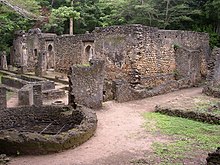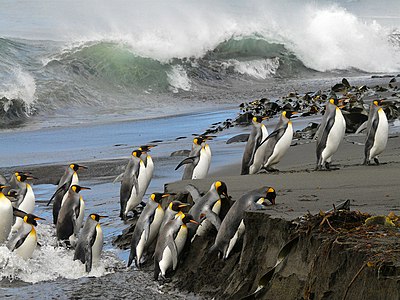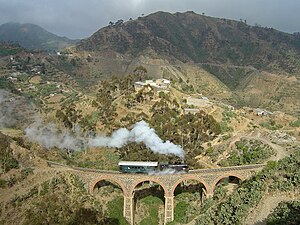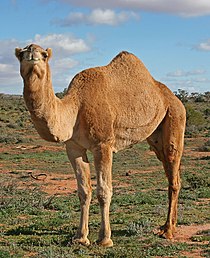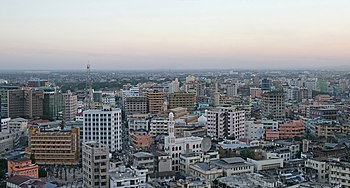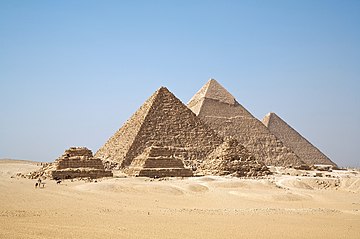
Back Portal:Afrika ALS بوابة:إفريقيا Arabic ܬܪܥܐ:ܐܦܪܝܩܐ ARC Portal:Afrika Azerbaijani Партал:Афрыка BE-X-OLD Портал:Африка Bulgarian دەروازە:ئەفریقا CKB Portál:Afrika Czech Portal:Afrika German Portal:Afrika DIQ



Africa is the world's second-largest and second-most populous continent after Asia. At about 30.3 million km2 (11.7 million square miles) including adjacent islands, it covers 20% of Earth's land area and 6% of its total surface area. With 1.4 billion people0 as of 2021, it accounts for about 18% of the world's human population. Africa's population is the youngest amongst all the continents; the median age in 2012 was 19.7, when the worldwide median age was 30.4. Despite a wide range of natural resources, Africa is the least wealthy continent per capita and second-least wealthy by total wealth, ahead of Oceania. Scholars have attributed this to different factors including geography, climate, corruption, colonialism, the Cold War, and neocolonialism. Despite this low concentration of wealth, recent economic expansion and the large and young population make Africa an important economic market in the broader global context. Africa has a large quantity of natural resources and food resources, including diamonds, sugar, salt, gold, iron, cobalt, uranium, copper, bauxite, silver, petroleum, natural gas, cocoa beans, and tropical fruit.
Africa straddles the equator and the prime meridian. It is the only continent to stretch from the northern temperate to the southern temperate zones. The majority of the continent and its countries are in the Northern Hemisphere, with a substantial portion and a number of countries in the Southern Hemisphere. Most of the continent lies in the tropics, except for a large part of Western Sahara, Algeria, Libya and Egypt, the northern tip of Mauritania, and the entire territories of Morocco, Ceuta, Melilla, and Tunisia which in turn are located above the tropic of Cancer, in the northern temperate zone. In the other extreme of the continent, southern Namibia, southern Botswana, great parts of South Africa, the entire territories of Lesotho and Eswatini and the southern tips of Mozambique and Madagascar are located below the tropic of Capricorn, in the southern temperate zone.
Africa is highly biodiverse; it is the continent with the largest number of megafauna species, as it was least affected by the extinction of the Pleistocene megafauna. However, Africa also is heavily affected by a wide range of environmental issues, including desertification, deforestation, water scarcity, and pollution. These entrenched environmental concerns are expected to worsen as climate change impacts Africa. The UN Intergovernmental Panel on Climate Change has identified Africa as the continent most vulnerable to climate change.
The history of Africa is long, complex, and varied, and has often been under-appreciated by the global historical community. Africa, particularly Eastern Africa, is widely accepted to be the place of origin of humans and the Hominidae clade, also known as the great apes. The earliest hominids and their ancestors have been dated to around 7 million years ago, including Sahelanthropus, Australopithecus africanus, A. afarensis, Homo erectus, H. habilis and H. ergaster, the earliest Homo sapiens (modern human) remains, found in Ethiopia, South Africa, and Morocco, date to circa 233,000, 259,000, and 300,000 years ago, respectively, and Homo sapiens is believed to have originated in Africa around 350,000–260,000 years ago. Africa is also considered by anthropologists to be the most genetically diverse continent as a result of being the longest inhabited. (Full article...)
Selected article –
The ruins of Gedi are a historical and archaeological site near the Indian Ocean coast of eastern Kenya. The site is adjacent to the town of Gedi (also known as Gede) in the Kilifi District and within the Arabuko-Sokoke Forest.
Gedi is one of many medieval Swahili coastal settlements that stretch from Barawa, Somalia to the Zambezi River in Mozambique. There are 116 known Swahili sites stretching from southern Somalia to Vumba Kuu at the Kenya-Tanzania border. Since the rediscovery of the Gedi ruins by colonialists in the 1920s, Gedi has been one of the most intensely excavated and studied of those sites, along with Shanga, Manda, Ungwana, Kilwa, and the Comoros. (Full article...)Featured pictures –
Did you know (auto-generated) -

- ... that the South Australian Labor politician Ernest Roberts served two tours in South Africa during the Second Boer War?
- ... that land for a library built for African Americans in Virginia was donated by Pope Pius XII?
- ... that Louise Fulton was the first African American to win a professional bowling tournament?
- ... that Albert Luthuli was the first African to win the Nobel Peace Prize?
- ... that in Africa, the criminalization of homosexuality was a colonial imposition and the decriminalization of homosexuality is resisted as a neocolonial imposition?
- ... that the bronze statue atop Thomas Eyre Macklin's 1907 South African War Memorial in Newcastle became known as the "Dirty Angel"?
Categories
Selected biography –
Pope Gelasius I was the bishop of Rome from 1 March 492 to his death on 19 November 496. Gelasius was a prolific author whose style placed him on the cusp between Late Antiquity and the Early Middle Ages. Some scholars have argued that his predecessor Felix III may have employed him to draft papal documents, although this is not certain.
During his pontificate he called for strict Catholic orthodoxy, more assertively demanded obedience to papal authority, and, consequently, increased the tension between the Western and Eastern Churches. Surprisingly, he also had cordial relations with the Ostrogoths, who were Arians (i.e. Non-trinitarian Christians), and therefore perceived as heretics from the perspective of Nicene Christians. (Full article...)Selected country –
 |
 |
||

| |||
Namibia, officially the Republic of Namibia, is a country in southern Africa on the Atlantic coast. It shares borders with Angola and Zambia to the north, Botswana to the east, and South Africa to the south. It gained independence from South Africa in 1990 and its capital city is Windhoek (German: Windhuk). It is divided into 13 regions and subdivided into 102 constituencies. Namibia is a member state of the United Nations (UN), the Southern African Development Community (SADC), the African Union (AU), and the Commonwealth of Nations.
The politics of Namibia takes place in a framework of a presidential representative democratic republic, whereby the President of Namibia is elected to a five year term and is both the head of state and the head of government, and of a multi-party system. Executive power is exercised by the government. Legislative power is vested in both the government and the two chambers of parliament. The Judiciary is independent of the executive and the legislature. (Read more...)
Selected city –
Lamu or Lamu Town is a small town on Lamu Island, which in turn is a part of the Lamu Archipelago in Kenya. Situated 341 kilometres (212 mi) by road northeast of Mombasa that ends at Mokowe Jetty, from where the sea channel has to be crossed to reach Lamu Island. It is the headquarter of Lamu County and a UNESCO World Heritage Site.
The town contains the Lamu Fort on the seafront, constructed under Fumo Madi ibn Abi Bakr, the sultan of Pate, and was completed after his death in the early 1820s. Lamu is also home to 23 mosques, including the Riyadha Mosque, built in 1900, and a donkey sanctuary. (Full article...)In the news
- 12 February 2024 –
- Two boats collide on the Congo River near Kinshasa, Democratic Republic of the Congo; with the death toll remains unclear. (AP)
- 11 February 2024 – 2023 Africa Cup of Nations
- In association football, hosts Ivory Coast win their third Africa Cup of Nations by defeating Nigeria 2–1 in the final. Sébastien Haller scores the winning goal in the 81st minute. (The Guardian)
- 10 February 2024 – Somali civil war
- Four Emirati soldiers and a Bahraini military officer are killed, while ten other people are injured, when a soldier opens fire at a military base in Mogadishu, Somalia, before being killed in the ensuing shootout. Al-Shabaab claims responsibility. (AP)
- 10 February 2024 –
- A Eurocopter EC130 helicopter crashes near Nipton, California, United States, killing all the six people on board, including Nigerian banker Herbert Wigwe. (CBS News)
- 10 February 2024 – 2023–2024 Senegalese protests
- Violent protests occur in Senegal following an announcement by President Macky Sall that presidential elections have been delayed from February 25 to December 15. (Sky News)
- 9 February 2024 –
- At least 18 people are killed during a collision between a bus and a truck on a road in Kinshasa, Democratic Republic of the Congo. (AP)
Updated: 16:33, 14 February 2024
General images -
Africa topics
More did you know –
- ...that Rukwanzi Island, an island in Lake Albert, one of the African Great Lakes, is the subject of a territorial dispute between the Democratic Republic of the Congo and Uganda?
- ...that Oumarou Sidikou, vice-governor of the Central Bank of West African States from 1988 to 1993, was a minister in the government of Nigerien Prime Minister Hama Amadou, which was ousted by a military coup in 1996?
- ...that Jason Dunford, an All-Africa Games gold medalist and runner-up for the 2006 Kenyan Sportsman of the Year award, has a younger brother who was selected "most promising sportsman" at the same awards?
- ...that Sam Mbakwe, governor of Imo State from 1979 to 1983, served in the army of the Republic of Biafra, an Igbo secessionist state in southeastern Nigeria, during the Nigerian Civil War?
Related portals
Major Religions in Africa
North Africa
West Africa
Central Africa
East Africa
Southern Africa
Associated Wikimedia
The following Wikimedia Foundation sister projects provide more on this subject:
-
Commons
Free media repository -
Wikibooks
Free textbooks and manuals -
Wikidata
Free knowledge base -
Wikinews
Free-content news -
Wikiquote
Collection of quotations -
Wikisource
Free-content library -
Wikispecies
Directory of species -
Wikiversity
Free learning tools -
Wikivoyage
Free travel guide -
Wiktionary
Dictionary and thesaurus
More portals
© MMXXIII Rich X Search. We shall prevail. All rights reserved. Rich X Search
